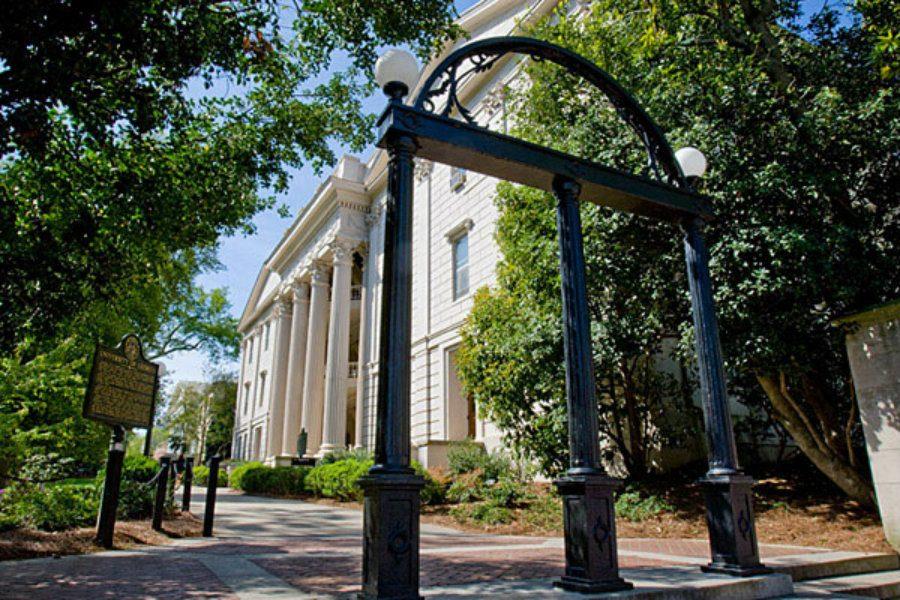Starr’s Mill students strive to fulfill college expectations
onlineathens.com
An angular perspective of the University of Georgia’s campus in Athens. Attending the University of Georgia is an ultimate goal for numerous students living in Georgia, but the rising competitiveness of the applicant pool each year has made it necessary for applicants to have exceptional academic credentials. The overall grade point average of the Class of 2020 is a 3.98, and more than 96% of students were in their high school’s “advanced” or “most difficult” curriculum.
September 24, 2016
A college education has become increasingly valuable to obtain in today’s society. For most Americans, earning a degree of higher education is essential to successfully land a high-paying job and secure a prosperous future. Statistics confirm that college graduates are offered more opportunities in their career, have a higher likelihood of experiencing job stability, and earn more money in comparison to their uneducated counterparts.
As having plans to attend college is becoming more of a prerequisite to prosperity and less of an option in our current nation, teenagers and young adults are pressured to do whatever it takes to come off as perfect applicants to colleges and universities and ensure their financial successes in adulthood in the form of an acceptance letter. Based on the responses to an anonymous survey conducted at Starr’s Mill, most students agree that there is a logical correlation between income and education. “It seems like any lucrative job requires a bachelor’s or master’s degree,” one student said.
Colleges and universities in the United States have become notably more difficult to get into throughout the years. As the national applicant pool becomes more competitive each year, colleges and universities are forced to reject more students and, as a result, have lower acceptance rates. Stanford University in Stanford, California, received 43,997 applications from students worldwide and ultimately admitted 2,063 of them in the Class of 2020, making the distinguished university’s acceptance rate plummet to an all-time low of 4.69%.
Therefore, in attempt to guarantee admission to colleges and universities, many high school students find themselves taking the most rigorous classes available in their high school curriculum and joining extracurricular activities that look impressive to admissions officers. “My schedule is rigorous because I want to appeal to the colleges I apply to,” another student said, “and, as much as I hate to admit it, looking impressive to colleges is one key reason why I am so involved in activities, as well.”
Being an academic star and active participant in clubs, community service, and sports, however, is no easy feat. Most college-oriented students are forced to sacrifice their hours of sleep as part of devoting their high school years to maintaining flawless transcripts and building their college applications. “I get about six hours of sleep on an average night,” one student said.
Despite the difficulties faced and unfortunate sacrifices needed to be made, students remain optimistic and motivated to continue working hard in school by taking the future into account. “School is very important to me because it gives a foundation for life after I graduate high school and college,” one student said.
Students also remain driven to work hard in school by conducting extensive research on colleges and knowing what is expected of them by college admissions officers. “Colleges are looking for well-rounded students,” Starr’s Mill guidance counselor Paula O’Shields said. “It helps to take challenging classes and be involved. The more prestigious a college is, the more important it will be to have taken rigorous classes as well as a high grade point average, superb test scores, and quality extracurricular activities.”
Investing time toward participating in school activities can be enjoyable for prospective college students when they are passionate about what they do. Although most colleges undoubtedly seek academically successful students who have challenged themselves in high school, the popular belief that a candidate should join as many extracurricular activities as humanly possible doesn’t resonate with admissions officers.
The truth is that colleges are attracted to students who genuinely enjoy participating in the activities they’re part of, and, as a result, excel in. “I would rather a student tell me about the handful of clubs and activities they have been involved with and excelled in,” Lasell College associate director of admission Kaitlyn Botelho said in a Washington Post article, “rather than an exhaustive list of clubs that they have feigned interest in, kind-of-sort-of-one-day.”
The benefits of a prospective college student limiting themselves to fewer activities, for the most part, outweigh the disadvantages. Although not being active in every single sport and club offered may look disadvantageous from afar, students who limit themselves to partaking in a handful of activities are more likely to not only achieve in them but also submit more memorable applications and distinguish themselves from other candidates. “If you pursue your passion, you will have developed a love for and skill at something that helps distinguish you from other applications – something that is your ‘hook’,” Assistant Director at MIT Admissions Chris Peterson said in one of his blog posts from 2010.
It can also be more difficult for a student to excel in countless activities, especially when he or she also has to focus on performing well in the classroom as well as taking care of other non-school related priorities. Because of this, students who attempt to minimally participate in every extracurricular activity do not only fail to stand out to admissions officers but are also more prone to burning out before graduating high school. Generally, they are either “left with little time to flourish in any one organization or suffer academically due to over-involvement,” Botelho said.
Although it is essential for students to have a challenging, solid course load, receiving good grades in classes is more crucial. Because of this, counselors also advise students to not overwhelm themselves with an abundance of class work they cannot handle. Taking on more responsibilities than one can manage does not only result in earning lower grades but also additional problems, such as low self-esteem and stress, to emerge. “Being overinvolved is unhealthy,” O’Shields said. “It can lead to stress, and students can’t do as well in activities as they could because they’re invested in too many of them. Students can’t be successful in every single activity at the same time, or at least it’s very difficult to.”
The main advice that counselors offer to prospective college students is to focus on performing well in high school and researching potential colleges as soon as possible. “Students should investigate different colleges to find the college that will best fit them and their future plans,” O’Shields said, “and then prepare themselves for what colleges are looking for.”
Prospective college students should “be the best students at the high school level as much as possible,” O’Shields said. “Students hoping to attend college should be genuinely involved, work hard, and get to know themselves and how to be academically successful in general. Then the doors will open.”








